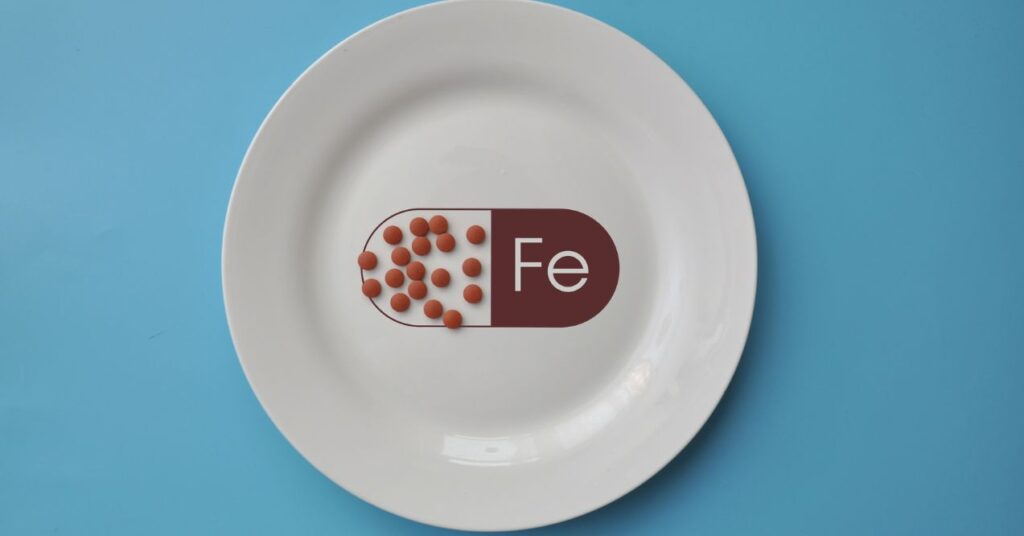Can You Take Iron and Magnesium Together?
Can you take iron and magnesium together? Find out in our detailed guide on the absorption and effects of these crucial minerals. Discover the best ways to supplement effectively. Read more!


Can you take iron and magnesium together? Minerals like iron and magnesium are fundamental to human health, playing vital roles in numerous biological processes.
Iron is crucial for the production of hemoglobin, which helps to transport oxygen throughout the body, while magnesium supports energy production and nerve function. Given their importance, it’s natural to wonder whether these two minerals can be supplemented together without interfering with each other’s absorption or effectiveness.
Through understanding their benefits, sources, and the factors influencing their absorption, this blog aims to look into the compatibility of iron and magnesium supplements, exploring how they influence each other and the best practices for their concurrent use.
What is Iron?
In essence, iron is a crucial mineral that is essential for the overall health and functioning of the human body. It primarily aids in the formation of hemoglobin and myoglobin, proteins that are responsible for carrying oxygen throughout the blood and muscles, respectively.
This oxygen transport is critical for energy production, supporting cellular activities that sustain daily physiological functions. Additionally, iron plays a significant role in immune function and cognitive development, making it indispensable for both mental and physical health.

Moreover, iron deficiency is among the most common nutritional deficiencies globally, affecting a large portion of the population. Recognizing 15 signs you are iron deficient can help in addressing this issue promptly, ensuring that the body does not lack the iron necessary to perform optimally.
Iron Benefits
The benefits of iron are vast and vital for a healthy life. By facilitating oxygen transport in the blood, iron not only helps in energy production but also enhances athletic performance and vitality. It supports a robust immune system, enabling the body to fight off infections more effectively. Moreover, iron contributes to neurological development and maintains cognitive functions, playing a role in processes such as learning and memory. It is also one of the best vitamins for tired legs and other similar health problems, making it an essential nutrient for overall health.
Food Sources of Iron
A balanced diet can generally provide adequate amounts of iron. Rich sources of iron include red meat, poultry, and seafood, which contain heme iron that is more easily absorbed by the body. Non-heme iron, found in plant-based foods like beans, lentils, and spinach, is also vital, though it is absorbed less efficiently. Additionally, many types of bread, cereals, and pasta are fortified with iron, offering an excellent way to boost iron intake, especially for those with dietary restrictions or preferences that limit the consumption of traditional iron-rich foods.
What is Magnesium?
Magnesium is an essential mineral pivotal for numerous biochemical functions in the body. It participates in more than 300 enzymatic reactions, including protein synthesis, muscle and nerve function, blood glucose control, and blood pressure regulation. This wide range of activities highlights magnesium’s fundamental role in maintaining overall health and well-being.

The importance of magnesium can be underscored by noting the warning signs of magnesium deficiency, which include symptoms such as muscle cramps, fatigue, and irregular heart rhythms. Understanding these signs can help in early detection and management of magnesium levels in the body.
Additionally, when considering magnesium supplements, it’s important to compare different forms like magnesium citrate vs glycinate; each has different benefits and bioavailability suited to varying health needs. Magnesium is also recognized as a beneficial supplement for tinnitus relief, helping to support proper nerve function, which can alleviate symptoms associated with tinnitus.
But as you learn more about magnesium’s importance, a key question often comes up: how long does magnesium stay in your body? To find out, be sure to read our in-depth article: “How Long Does Magnesium Stay in Your Body” for detailed insights.
Magnesium Benefits
Magnesium’s benefits are broad and crucial for the human body. It aids in the maintenance of normal nerve and muscle function, supports a healthy immune system, keeps the heartbeat steady, and helps bones remain strong. It also assists in regulating blood glucose levels and aids in the production of energy and protein. Given its extensive involvement in critical physiological processes, adequate magnesium intake is vital for preventing chronic diseases, particularly those related to aging and stress.
Food Sources of Magnesium
Magnesium is abundant in a variety of foods, making it accessible through a balanced diet. Excellent sources include:
- Nuts like almonds and cashews
- Seeds such as pumpkin and chia
- Whole grains like brown rice and quinoa.
Green leafy vegetables, particularly spinach and kale, are also rich in magnesium. For those who might find it challenging to consume sufficient amounts through diet alone, magnesium is also available in fortified foods and as dietary supplements for optimal health, providing multiple avenues to ensure adequate intake.
Can You Supplement Iron And Magnesium Together?
Can you take iron and magnesium together? Supplementing with iron and magnesium can compete for absorption in the digestive tract, and the presence of one mineral may impact the absorption of another. This competition can influence how effectively each mineral is utilized by the body.
What Influences Iron and Magnesium Absorption?
The absorption of iron and magnesium can be influenced by various dietary components and physiological conditions. Here are some key factors that can affect the absorption of these minerals:
- High doses of zinc can decrease iron absorption due to competitive inhibition.
- Excessive fiber intake can reduce magnesium absorption as fiber binds with magnesium, making it less available to the body.
- Vitamin D enhances magnesium absorption by helping regulate calcium levels, which indirectly supports magnesium uptake.
- Vitamin A deficiency may exacerbate iron-deficiency (anemia) by altering iron metabolism, affecting how iron is stored and mobilized.
- Calcium can decrease the absorption of iron, affecting iron levels in the body.
- Zinc deficiency can exacerbate iron-deficiency anemia by altering overall mineral balance and iron metabolism.
- Low copper levels can reduce iron absorption, highlighting the complex interplay between trace minerals.
These factors indicate that the question of whether iron and magnesium can be taken together without causing absorption issues is complex. Concerns about whether does magnesium lower iron absorption or if can magnesium supplements affect iron levels are valid and require consideration of individual health conditions and dietary patterns.
Recommended Intake
The daily recommended intake for iron and magnesium varies based on age, sex, and life stages, such as pregnancy.
Iron
- Women – Generally require more iron than men (18 mg/day , especially during childbearing years to compensate for menstrual losses and support pregnancy.
- Men – Require less iron than women of childbearing age, typically around 8 mg/day.
Magnesium
- Women – Recommended to consume about 310-320 mg of magnesium daily, depending on age.
- Men – Require a bit more, around 400-420 mg per day.
It’s important to note that the presence of one mineral can affect the absorption of another. For instance, high magnesium intake might lower iron levels because magnesium can compete with iron for absorption.
How to Take It?
To maximize the benefits of iron and magnesium supplements while minimizing potential interactions, consider the following strategies:
- Timing – Taking iron and magnesium at different times of the day can help reduce their competitive absorption. For example, iron could be taken in the morning and magnesium in the evening.
- With meals – Taking supplements with food can enhance absorption and reduce stomach upset, especially with iron, which may cause gastrointestinal discomfort if taken on an empty stomach.
- Consult healthcare providers – It is always advisable to consult with a healthcare provider before starting any supplementation regime, especially if you have underlying health conditions or are taking other medications. This can help tailor advice to your specific health needs and conditions.
In conclusion, while it is possible to supplement with both iron and magnesium, careful consideration of their interaction, the timing of ingestion, and individual health conditions is crucial. Optimizing the intake of these vital minerals can significantly impact overall health and well-being, underscoring the importance of a personalized approach to dietary supplementation.
Key Takeaways
So, can you take iron and magnesium together? While both are essential minerals, they can compete for absorption in the digestive tract, potentially reducing their effectiveness when taken at the same time. Various factors, including dietary components, health conditions, and supplement forms like citrate or glycinate, influence how well the body absorbs these minerals. To optimize absorption, it is best to take iron and magnesium at different times of the day.
Consulting a healthcare professional before starting a new supplement regimen is always advisable, especially when combining these two minerals. Understanding these considerations allows for informed decisions that maximize health benefits while minimizing potential interactions.
Magnesium can interfere with calcium, zinc, and iron absorption. High doses may also affect vitamin D by altering calcium metabolism. To maximize benefits, take these supplements at different times.
Wait at least two hours between taking iron and magnesium to prevent absorption interference and ensure maximum effectiveness.
Iron absorption is reduced by calcium, magnesium, zinc, copper, and high doses of vitamin E. It’s best to take iron separately but with vitamin C, which enhances absorption.
Yes, iron and magnesium compete for absorption, reducing effectiveness. To avoid this, take them a few hours apart.
Sign up for our Healthy Living newsletter!
Advertisement. This site offers health, wellness, fitness and nutritional information and is designed for educational purposes only. You should not rely on this information as a substitute for, nor does it replace, professional medical advice, diagnosis, or treatment. If you have any concerns or questions about your health, you should always consult with a physician or other health-care professional. Do not disregard, avoid or delay obtaining medical or health related advice from your health-care professional because of something you may have read on this site. The use of any information provided on this site is solely at your own risk.













